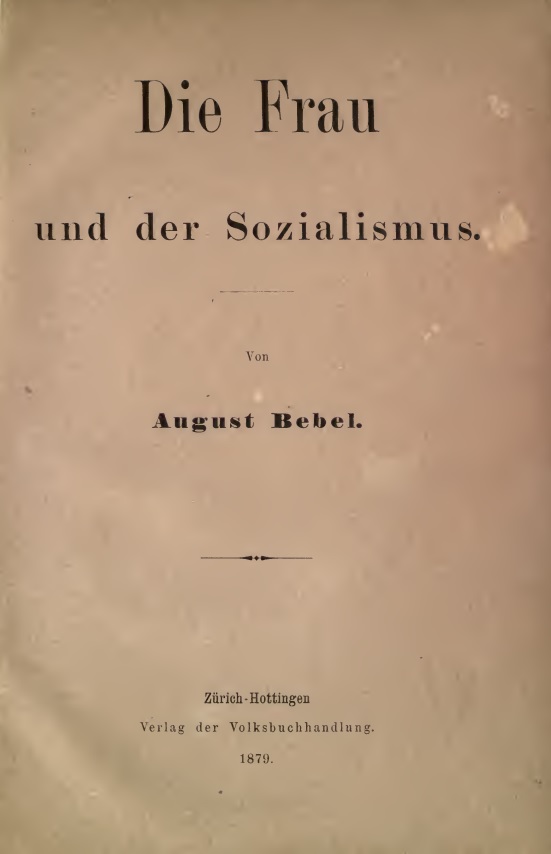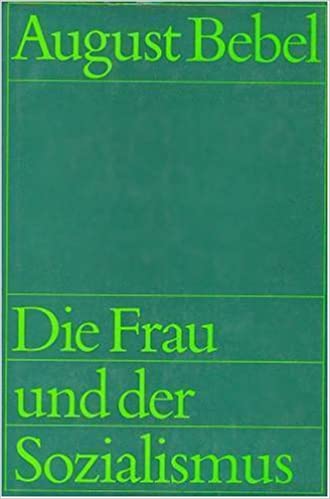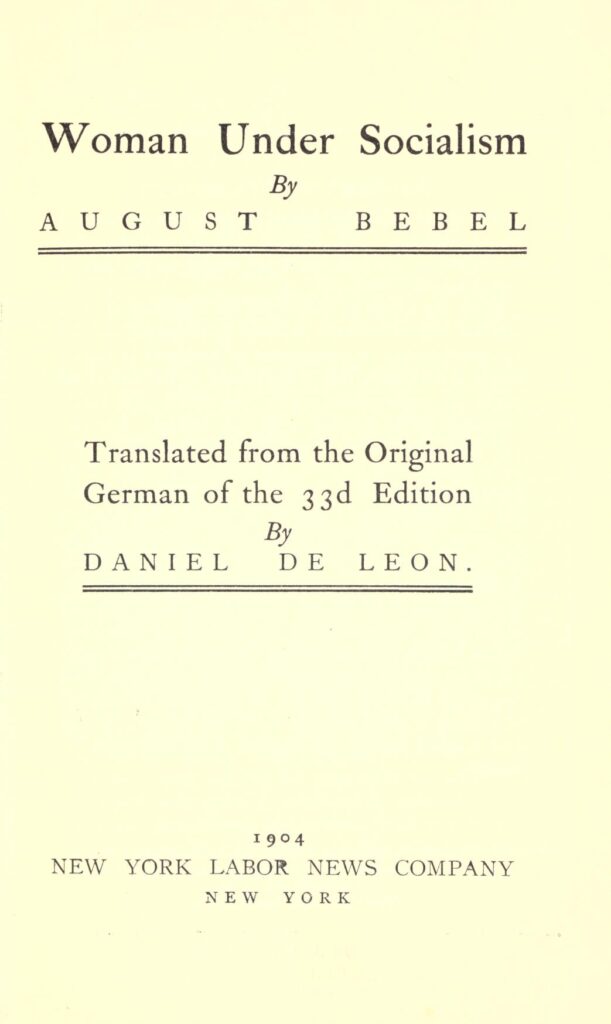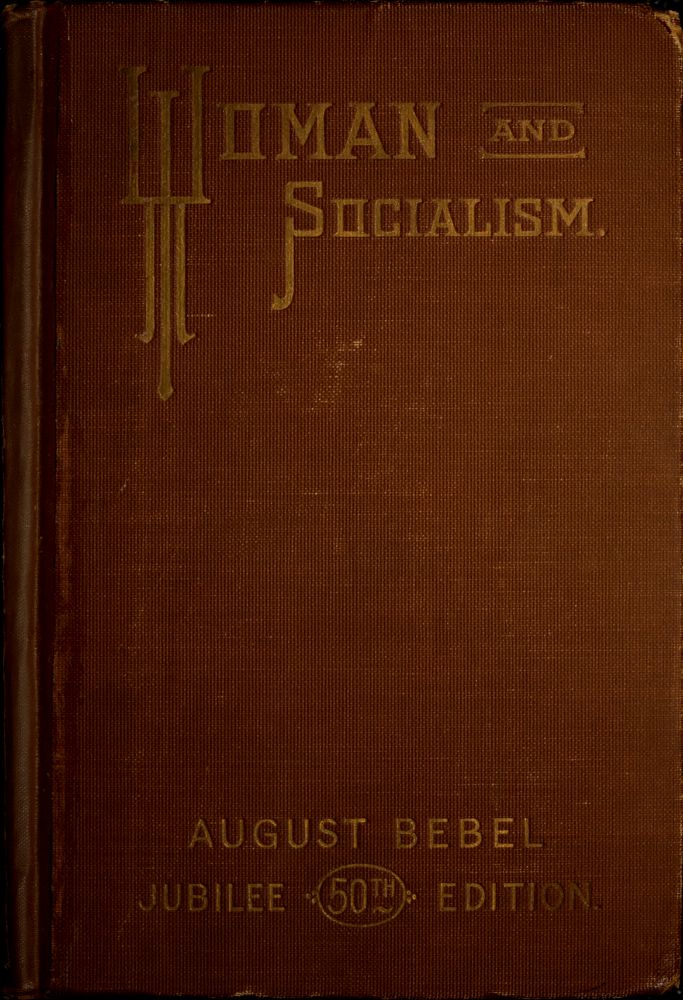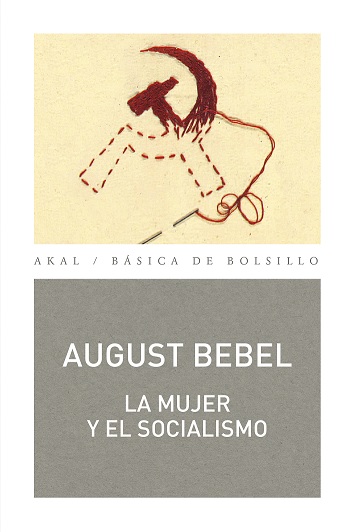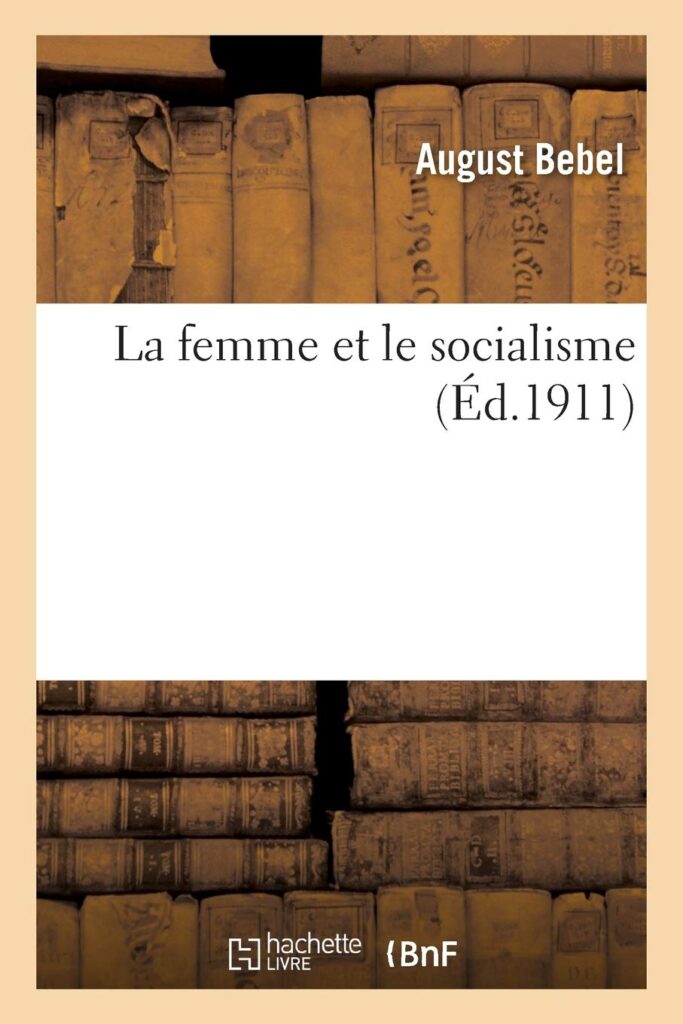Biblioteca / 1870-1879 1910-1919 1970-1979
August Bebel. Die Frau und der Sozialismus.
Zürich-Hottingen: Verlag der Volksbuchhandlung, 1879.
Edición francesa, La femme et le socialisme. París, 1891. Traducción: Henri Bavé.
Edición completa en francés, Gante: Imprimerie Cooperative Volksdrukkerij, 1911.
Edición en inglés, Woman under socialism. New York: New York Labor News Co., 1904. Traducción: Daniel De Leon (de la 33° edición alemana).
2da edición en inglés, Woman and socialism. New York: Socialist Literature Co., 1910. Traducción: Meta L. Stern.
Edición española, La mujer y el socialismo. Madrid: Akal. 1977. Traducción: Vicente Romano García (de la 63° edición alemana, 1974)
August Bebel (1840-1913)
INHALT
August Bebel – Lexikalische Biografie
Vorreden
Zur fünfundzwanzigsten Auflage [1895]
Zur vierunddreißigsten Auflage [1902]
Zur fünfzigsten Auflage [1909]
Die Frau und der Sozialismus
Einleitung
Erster Abschnitt – Die Frau in der Vergangenheit
Erstes Kapitel – Die Stellung der Frau in der Urgesellschaft
Zweites Kapitel – Kampf zwischen Mutterrecht und Vaterrecht
Drittes Kapitel – Das Christentum
Viertes Kapitel – Die Frau im Mittelalter
Fünftes Kapitel – Die Reformation
Sechstes Kapitel – Das achtzehnte Jahrhundert
Zeiter Abschnitt – Die Frau in der Gegenwart
Siebentes Kapitel – Die Frau als Geschlechtswesen
Achtes Kapitel – Die moderne Ehe
Neuntes Kapitel – Zerrüttung der Familie
Zehntes Kapitel – Die Ehe als Versorgungsanstalt
Elftes Kapitel – Die Chancen der Ehe
Zwölftes Kapitel – Die Prostitution eine notwendige soziale Institution der bürgerlichen Welt
Dreizehntes Kapitel – Die Erwerbsstellung der Frau
Vierzehntes Kapitel – Der Kampf der Frau um die Bildung
Fünfzehntes Kapitel – Die rechtliche Stellung der Frau
Dritter Abschnitt – Staat und Gesellschaft
Sechzehntes Kapitel – Der Klassenstaat und das moderne Proletariat
Siebzehntes Kapitel – Der Konzentrationsprozeß in der kapitalistischen Industrie
Achtzehntes Kapitel – Krisen und Konkurrenz
Neunzehntes Kapitel – Die Revolution in der Landwirtschaft
Vierter Abschnitt – Die Sozialisierung der Gesellschaft
Zwanzigstes Kapitel – Die soziale Revolution
Einundzwanzigstes Kapitel – Grundgesetze der sozialistischen Gesellschaft
Zweiundzwanzigstes Kapitel – Sozialismus und Landwirtschaft
Dreiundzwanzigstes Kapitel – Aufhebung des Staates
Vierundzwanzigstes Kapitel – Die Zukunft der Religion
Fünfundzwanzigstes Kapitel – Das sozialistische Erziehungswesen
Sechsundzwanzigstes Kapitel – Kunst und Literatur in der sozialistischen Gesellschaft
Siebenundzwanzigstes Kapitel – Freie Entwicklung der Persönlichkeit
Achtundzwanzigstes Kapitel – Die Frau in der Zukunft
Neunundzwanzigstes Kapitel – Die Internationalität
Dreißigstes Kapitel – Bevölkerungsfrage und Sozialismus
____________
INDEX
[Edición de 1904]
TRANSLATOR’S PREFACE
INTRODUCTION
WOMAN IN THE PAST
I – Before Christianity
II – Under Christianity
WOMAN IN THE PRESENT
I – Sexual Instinct, Wedlock, Checks and Obstructions to Marriage
II – Further Checks and Obstructions to Marriage, Numerical Proportion of the Sexes, Its Causes and Effects
III – Prostitution a Necessary Social Institution of the Capitalist World
IV – Woman’s Position as a Breadwinner, Her Intellectual Faculties, Darwinism and the Condition of Society
V – Woman’s Civic and Political Status
VI – The State and Society
VII – The Socialization of Society
WOMAN IN THE FUTURE
INTERNATIONALITY
POPULATION AND OVER-POPULATION
CONCLUSION
____________
CONTENTS
[Edición de 1910]
Introduction
WOMAN IN THE PAST
I — The Position of Woman in Primeval Society
II — Conflict Between Matriarchate and Patriarchate
III — Ghristianity
IV — Woman in the Mediaeval Age
V — The Reformation
VI — The Eighteenth Century
WOMAN AT THE PRESENT DAY
VII — Woman as a Sex Being
VIII — Modern Marriage
IX — Disruption of the Family
X — Marriage as a Means of Support
XI — The Chances of Matrimony
XII — Prostitution a Necessary Social Institution of Bourgeois Siociety
XIII — Woman in Industry
XIV — The Struggle of Woman for Education
XV — The Legal Status of Women
STATE AND SOCIETY
XVI — The Class-State and the Modern Proletariat
XVII — The Process of Concentration in Capitalistic Industry
XVIII — Crises and Competition
XIX — The Revolution in Agriculture
THE SOCIALIZATION OF SOCIETY
XX — The Social Revolution
XXI — Fundamental Laws of Socialistic Society
XXII — Socialism and Agriculture
XXIII — Abolition of the State
XXIV — The Future of Religion
XXV — The Socialist System of Education
XXVI — Literature and Art in Socialistic Society
XXVII — Free Development of Individuality
XXVIII — Woman in the Future
XXIX — Internationality
XXIX — The Question of Population and Socialism
Conclusion
____________
ÍNDICE
Prólogo a la edición castellana / Vicente Romano García [1976]
Prólogo a la vigésimoquinta edición [1895]
Prólogo a la XXXIV edición [1902]
Prólogo a la L edición [1909]
Introducción
Sección primera
LA MUJER EN EL PASADO
I – La posición de la mujer en la sociedad primitiva
II – Lucha entre derecho materno y paterno
III – El cristianismo
IV – La mujer en la Edad Media
V – La Reforma
VI – El siglo XVIII
Sección segunda
LA MUJER EN EL PRESENTE
VII – La mujer como ser sexual
VIII – El matrimonio moderno
IX – Destrucción de la familia
X – El matrimonio como acomodo
XI – Las oportunidades del matrimonio
XII – La prostitución: Institución social necesaria del mundo burgués
XIII – La posición laboral de la mujer
XIV – La lucha de la mujer por la educación
XV – La posición jurídica de la mujer
Sección tercera
EL ESTADO Y LA SOCIEDAD
XVI – El Estado clasista y el proletariado moderno
XVII – El proceso de concentración en la industria capitalista
XVIII – Crisis y competencia
XIX – La revolución en la agricultura
Sección cuarta
LA SOCIALIZACION DE LA SOCIEDAD
XX – La revolución social
XXI – Leyes Fundamentales de la sociedad capitalista
XXII – Socialismo y agricultura
XXIII – Eliminación del Estado
XXIV – El porvenir de la religión
XXV – El sistema socialista de educación
XXVI – Arte y literatura en la sociedad socialista
XXVII – El desarrollo de la personalidad
XXVIII – La mujer en el futuro
XXIX – El internacionalismo
XXX – La cuestión de la población y el socialismo
Conclusión
